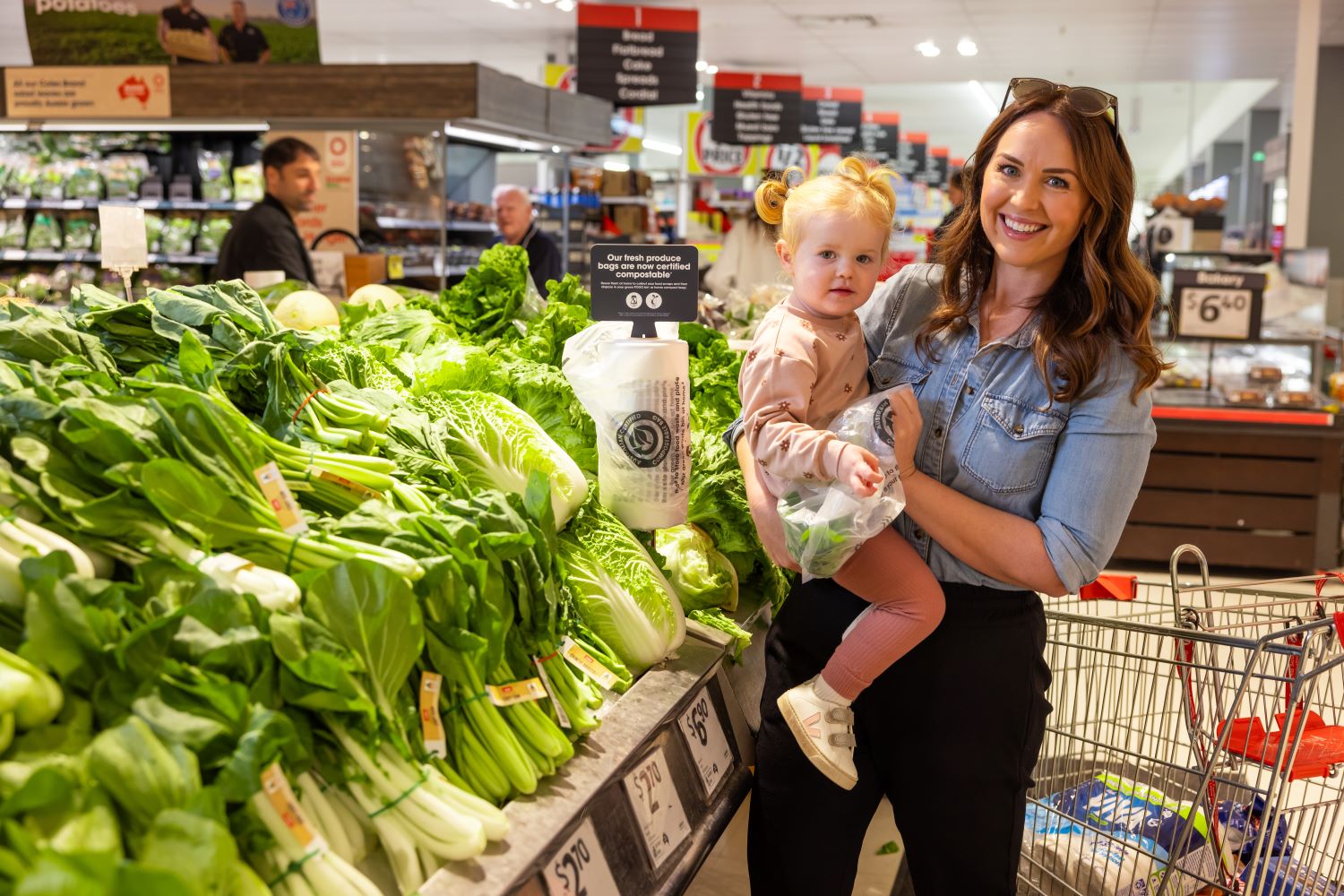—
Coles has removed single-use fresh produce plastic bags in all stores across Western Australia, in line with the next stage of the State’s plastic ban which comes into effect on 1 September - a change that will remove 36 million conventional plastic produce bags from circulation in one year.
The new fresh produce bags can be reused to collect kitchen food scraps and then either added to home compost heaps or for those in participating Local Government Areas, disposed of in customers’ green council bin.
Made from compostable materials including natural plant starch, the new clear bags carry the Australasian seedling logo which certifies their ‘compostability’ as per the Australian Standard, helping customers to recognise compostable packaging and dispose of them correctly.
Coles Group Chief Operations and Sustainability Officer Matt Swindells said the change introduced across the retailer’s 101 Western Australian stores will reduce the number of conventional plastic bags in circulation and help encourage home composting.
“Our customers will now be able to pack their fresh fruit and veg in certified compostable bags that can either be put it in their council bin for those in participating Local Government Areas or added to home compost where it will break down naturally,” he said.
“We know our customers want to see less plastic in our stores, and this latest change will see the removal of 36 million conventional plastic produce bags from circulation in Western Australia in just one year,” he said.
Coles partner Planet Ark’s Chief Executive Officer Rebecca Gilling congratulated Coles on its move to provide certified compostable bags in the fresh produce section of all its WA supermarkets but encouraged customers to remember to bring their own reusable bags to store.
“Compostable bags help families recycle food waste by providing them with an easy and convenient way to collect food scraps at home that otherwise could have ended up in landfill. They’re also budget friendly, reducing the need for families to buy their own kitchen caddy bags,” said Rebecca.
“While this is definitely a step in the right direction, our advice to customers purchasing loose fruit and vegetables is to place items directly into their trolley or basket wherever possible, particularly products with their own ‘natural packaging’ such as bananas and avocados, or bring their own reusable produce bags,” she added.
Western Australia now joins South Australia as the two states to have phased out plastic fresh produce bags. In 2023 Coles stopped selling soft plastic shopping bags in-store and online which removed 230 million plastic bags from circulation in one year . 100% recycled paper bags that can be recycled kerbside are now available for purchase, as well as a range of reusable tote, chiller and mesh produce bags.
 Karen Giovannetti with daughter Tara at Coles Melville, Western Australia
Karen Giovannetti with daughter Tara at Coles Melville, Western Australia
For media enquiries, please contact
Coles Media Line (03) 9829 5250 or [email protected]
The new fresh produce bags can be reused to collect kitchen food scraps and then either added to home compost heaps or for those in participating Local Government Areas, disposed of in customers’ green council bin.
Made from compostable materials including natural plant starch, the new clear bags carry the Australasian seedling logo which certifies their ‘compostability’ as per the Australian Standard, helping customers to recognise compostable packaging and dispose of them correctly.
Coles Group Chief Operations and Sustainability Officer Matt Swindells said the change introduced across the retailer’s 101 Western Australian stores will reduce the number of conventional plastic bags in circulation and help encourage home composting.
“Our customers will now be able to pack their fresh fruit and veg in certified compostable bags that can either be put it in their council bin for those in participating Local Government Areas or added to home compost where it will break down naturally,” he said.
“We know our customers want to see less plastic in our stores, and this latest change will see the removal of 36 million conventional plastic produce bags from circulation in Western Australia in just one year,” he said.
Coles partner Planet Ark’s Chief Executive Officer Rebecca Gilling congratulated Coles on its move to provide certified compostable bags in the fresh produce section of all its WA supermarkets but encouraged customers to remember to bring their own reusable bags to store.
“Compostable bags help families recycle food waste by providing them with an easy and convenient way to collect food scraps at home that otherwise could have ended up in landfill. They’re also budget friendly, reducing the need for families to buy their own kitchen caddy bags,” said Rebecca.
“While this is definitely a step in the right direction, our advice to customers purchasing loose fruit and vegetables is to place items directly into their trolley or basket wherever possible, particularly products with their own ‘natural packaging’ such as bananas and avocados, or bring their own reusable produce bags,” she added.
Western Australia now joins South Australia as the two states to have phased out plastic fresh produce bags. In 2023 Coles stopped selling soft plastic shopping bags in-store and online which removed 230 million plastic bags from circulation in one year . 100% recycled paper bags that can be recycled kerbside are now available for purchase, as well as a range of reusable tote, chiller and mesh produce bags.
 Karen Giovannetti with daughter Tara at Coles Melville, Western Australia
Karen Giovannetti with daughter Tara at Coles Melville, Western Australia
For media enquiries, please contact
Coles Media Line (03) 9829 5250 or [email protected]
Release ID: 89139885




 Google
Google RSS
RSS